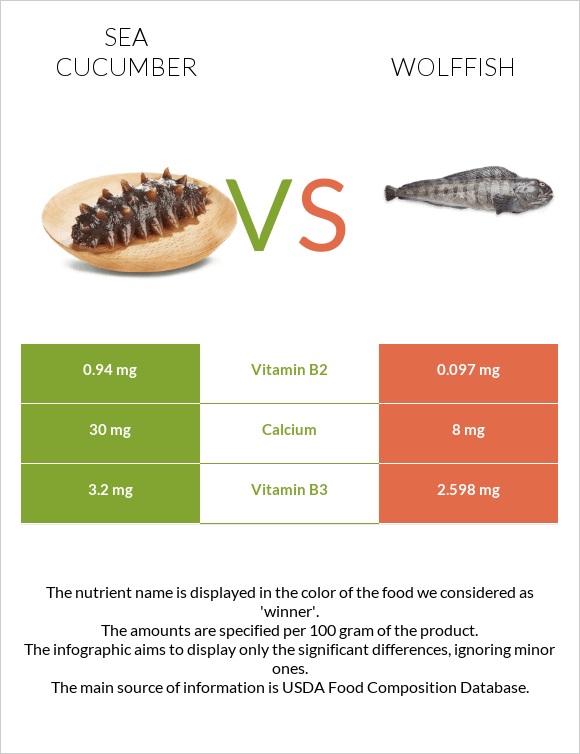Sea cucumber vs. Wolffish — In-Depth Nutrition Comparison
Compare
The main differences between sea cucumber and wolffish
- Sea cucumber has more vitamin B2 and iron; however, wolffish has more vitamin B1.
- Daily need coverage for vitamin B2 for sea cucumber is 65% higher.
- Wolffish has 5 times less iron than sea cucumber. Sea cucumber has 0.6mg of iron, while wolffish has 0.12mg.
Food types used in this article are Sea cucumber, yane (Alaska Native) and Fish, wolffish, Atlantic, cooked, dry heat.
Infographic

Infographic link
Mineral Comparison
Mineral comparison score is based on the number of minerals by which one or the other food is richer. The "coverage" charts below show how much of the daily needs can be covered by 300 grams of the food.
| Contains more CalciumCalcium | +275% |
| Contains more IronIron | +400% |
| Contains less SodiumSodium | -100% |
Vitamin Comparison
Vitamin comparison score is based on the number of vitamins by which one or the other food is richer. The "coverage" charts below show how much of the daily needs can be covered by 300 grams of the food.
| Contains more Vitamin B2Vitamin B2 | +869.1% |
| Contains more Vitamin B3Vitamin B3 | +23.2% |
| Contains more Vitamin B1Vitamin B1 | +316% |
All nutrients comparison - raw data values
| Nutrient |  |
 |
DV% diff. |
| Vitamin B12 | 2.35µg | 98% | |
| Selenium | 46.8µg | 85% | |
| Vitamin B2 | 0.94mg | 0.097mg | 65% |
| Phosphorus | 256mg | 37% | |
| Vitamin B6 | 0.462mg | 36% | |
| Cholesterol | 59mg | 20% | |
| Protein | 13g | 22.44g | 19% |
| Vitamin A | 130µg | 14% | |
| Vitamin B1 | 0.05mg | 0.208mg | 13% |
| Vitamin B5 | 0.658mg | 13% | |
| Potassium | 385mg | 11% | |
| Magnesium | 38mg | 9% | |
| Zinc | 1mg | 9% | |
| Polyunsaturated fat | 1.083g | 7% | |
| Iron | 0.6mg | 0.12mg | 6% |
| Sodium | 109mg | 5% | |
| Fats | 0.4g | 3.06g | 4% |
| Copper | 0.037mg | 4% | |
| Vitamin B3 | 3.2mg | 2.598mg | 4% |
| Calories | 56kcal | 123kcal | 3% |
| Monounsaturated fat | 1.072g | 3% | |
| Calcium | 30mg | 8mg | 2% |
| Folate | 6µg | 2% | |
| Saturated fat | 0.468g | 2% | |
| Manganese | 0.019mg | 1% | |
| Tryptophan | 0.251mg | 0% | |
| Threonine | 0.984mg | 0% | |
| Isoleucine | 1.034mg | 0% | |
| Leucine | 1.824mg | 0% | |
| Lysine | 2.061mg | 0% | |
| Methionine | 0.664mg | 0% | |
| Phenylalanine | 0.876mg | 0% | |
| Valine | 1.156mg | 0% | |
| Histidine | 0.661mg | 0% | |
| Omega-3 - EPA | 0.393g | N/A | |
| Omega-3 - DHA | 0.405g | N/A | |
| Omega-3 - DPA | 0.055g | N/A |
Macronutrient Comparison
Macronutrient breakdown side-by-side comparison
Protein:
13 g
Fats:
0.4 g
Carbs:
0 g
Water:
80.7 g
Other:
5.9 g
Protein:
22.44 g
Fats:
3.06 g
Carbs:
0 g
Water:
74.23 g
Other:
0.27 g
| Contains more OtherOther | +2085.2% |
| Contains more ProteinProtein | +72.6% |
| Contains more FatsFats | +665% |
~equal in
Carbs
~0g
~equal in
Water
~74.23g





